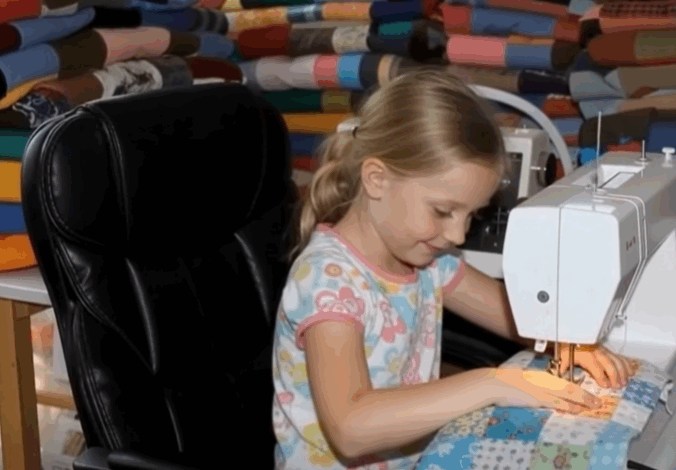Stepmom Trashed My Granddaughters 100 Blankets, She Never Expected What Came Next

Ellie was thirteen when she decided she wanted to keep strangers warm through the winter. She showed up at my house one rainy Saturday with a sketchbook full of patterns, scraps of fabric tucked under her arm, and a determination I’d only ever seen once before—when her mother was fighting cancer.
She told me she wanted to make one hundred blankets for people living on the streets. One hundred. Not fifty, not “as many as I can.” A full hundred.
“Because Mom always said you should do something kind when your heart hurts,” she whispered.
That was the first time she’d spoken about her grief without breaking down. I didn’t question it. I didn’t try to push her toward something easier. I simply opened my sewing drawer, cleared the dining table, and told her to pick a fabric to start with.
Week after week, Ellie returned. Sometimes with donations she had talked people into giving. Sometimes with new designs she’d drawn the night before. Sometimes with nothing but her sadness—but she always worked. We spent hours cutting fleece, measuring patterns, stitching edges, trimming corners. She sewed in silence most days, the soft hum of the machine grounding her in a world that had taken too much from her too soon.
Every blanket had a tiny heart stitched into the bottom right corner. A little reminder, she said, that someone out there still cared.
And bit by bit, I watched her heal in a way therapy and time hadn’t been able to touch. She was creating warmth for others while finding a little warmth for herself.
By November, all one hundred blankets were finished. Bright colors, soft textures, patterns that reflected every mood she’d moved through—stars, waves, checkered blues, soft pink florals. They were beautiful. They were hers. And she was so proud she nearly glowed.
Then the phone call came.
Ellie was sobbing so hard she couldn’t breathe. Her words came out in pieces, like she was choking on each one.
“Grandma… she threw them out. All of them. She said they were… garbage.”
Her stepmother, Diane—my son’s wife—had a talent for performing kindness online while practicing cruelty in private. She always made a show about “living with compassion,” posting long inspirational entries about positivity, charity, generosity. But at home, she controlled what Ellie wore, ate, said, and felt. She viewed kindness as a performance—not something your hands and heart should actually do.
While my son was out of town on business, she had walked into Ellie’s room, seen the neatly stacked blankets, and tossed them straight into the garbage bin behind the house. When Ellie begged her to stop, Diane said:
“No one wants this ugly clutter. You’re embarrassing yourself. Learn to do something useful.”
I didn’t yell. I didn’t curse. I didn’t waste a single breath giving Diane more of my energy.
I got in my car and drove straight to the dump.
The workers stared at me like I was insane when I started describing one hundred handmade blankets with little sewn hearts. But people who have lived long enough know that sometimes love requires getting dirty. We searched through piles of trash until we found them—stuffed in a black bag, thrown without a thought.
I washed every blanket. Dried them. Folded them. And while the machines hummed, I made phone calls—lots of them. I called volunteers, church leaders, teachers, the community center director, a local reporter, an old friend in the mayor’s office. Not to shame Diane. Not yet.
To lift Ellie.
On Sunday evening, I invited the whole family to what I told them was a simple dinner.
Diane walked into the community center in a designer dress, ready to play her usual role of the perfect stepmother. But instead of a dinner table, she walked into a room lined with Ellie’s blankets hanging beautifully across the walls like artwork. People were applauding. A camera crew was setting up. Volunteers held cups of cocoa. The mayor himself shook Ellie’s hand and thanked her for her generosity.
Diane froze. Her smile slipped. Her eyes darted around the room, calculating, panicked.
A reporter approached her with a bright smile.
“You must be so proud of the young girl you’re raising.”
Proud. Of the same child she belittled daily. Proud of the blankets she had thrown away.
Diane looked like she might faint.
Ellie stepped forward before Diane could speak. Her voice was soft but steady.
“It’s okay if you didn’t understand the blankets. Sometimes people throw away things that are valuable.”
The room went silent. Not hostile—just aware. People understood far more than she intended to reveal.
Diane excused herself, mumbling something about needing air, and left. She didn’t come back.
Later that night, my son returned from his trip. I told him everything—not to destroy his marriage, but because he deserved to know what his daughter had endured. He didn’t hesitate. Diane was gone by morning.
Ellie delivered the blankets on Christmas Eve. She handed them out one by one to people curled under bridges, sitting near shelters, warming their hands by portable heaters. She whispered, “This is for you,” and the stitched hearts glowed under the streetlights. Each blanket wrapped around someone who desperately needed warmth, and kindness, and proof that someone still cared.
As we drove home that night, snow falling gently outside the windows, Ellie squeezed my hand.
“Do you think Mom would be proud?” she asked.
I didn’t need a second to answer.
“She already is,” I said. “And so am I.”